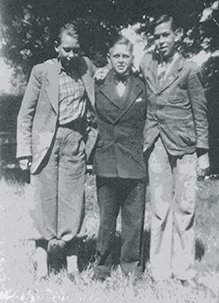Helmuth Hubener
 Helmuth Hübener was a teenaged anti-Nazi hero and a member of The Church of Jesus Christ of Latter-day Saints. He was born January 8, 1925, in Hamburg, Germany. Helmuth's mother and grandparents were also members of the Church. His surname comes from his adoptive father. The family was not politically active.
Helmuth Hübener was a teenaged anti-Nazi hero and a member of The Church of Jesus Christ of Latter-day Saints. He was born January 8, 1925, in Hamburg, Germany. Helmuth's mother and grandparents were also members of the Church. His surname comes from his adoptive father. The family was not politically active.
Helmuth had been active in the Boy Scouts from a young age, but scouting was banned in Germany in 1935. He became a member of Hitler Youth until Kristalnacht, in which Hitler Youth participated. One of the leaders of Hübener's Mormon congregation, a new convert to the Church, sought to ban Jews from their meetings. There were about 2,000 members in the area, and only about 7 who were pro-Hitler. Five of those seven were in Hübener's congregation, causing much discussion among the members. Helmuth was one who opposed banning Jews and opposed Hitler.
In his teens, Helmuth began listening to BBC radio broadcasts (which was forbidden by the Nazis), and he determined that the British knew the truth about Hitler. He sought to spread the truth and reveal the evils of the Third Reich. He began to compose various anti-fascist texts and anti-war leaflets, of which he also made many copies. The pamphlets also predicted the war's futility and Germany's looming defeat. He also mentioned the mistreatment sometimes meted out in the Hitler Youth. [1]
In the fall of 1941, Hübener enlisted the help of fellow Latter-day Saints, Karl-Heinz Schnibbe and Ruddi Wobbe, and later Gerhard Duwer. They helped to distribute about 60 different pamphlets. On 5 February 1942, Helmuth Hübener was arrested by the Gestapo. On 11 August 1942, Hübener's case was tried at the Volksgerichtshof in Berlin, and on 27 October, at the age of 17, he was beheaded by guillotine at Plötzensee Prison in Berlin. His two friends, Schnibbe and Wobbe, who had also been arrested, were given prison sentences of five and ten years respectively.
The court decide to punish Hübener as an adult, because of his mature and sharp intellect. He was executed only seven hours after being told of his sentence. His lawyers and family had pleaded for life imprisonment instead of death for him. Since he was tried as an adult and an enemy of the State, he was subject to torture and difficult living conditions in prison.
Excommunication from the Church is often meted out to criminals, and after the sentence was revealed, local church authorities excommunicated Helmuth. As soon as the news reached church headquarters in Salt Lake City, however, church leaders immediately reinstated him into full church fellowship. Local leaders had not followed church policy, it was determined. The day of his execution he wrote to the fellow branch member, "I know that God lives and He will be the Just Judge in this matter... I look forward to seeing you in a better world!" (Hübener at Dixie State College". 2005-03-14.) [2]
A youth centre and a pathway in Hamburg are now named for Helmuth Hübener. At the former Plötzensee Prison in Berlin, an exhibit about young Helmuth Hübener's resistance, trial, and execution is located in the former guillotine chamber, where floral tributes are often placed in memory of Hübener and others put to death by the Nazis there.
Hübener's story has been the subject of various literary, dramatic, and cinematic works. In 1969, German author Günter Grass wrote the book Örtlich betäubt ("Local anesthetic"), later translated into English, about the Hübener group. In 1979 Brigham Young University professor Thomas Rogers wrote a play titled Huebener, which has had several runs in various venues. Schnibbe, one of Hübener's co-accused, attended some of the performances on the BYU campus. Rudi Wobbe, another co-accused, attended one. Wobbe later died of cancer in 1992.
Schnibbe wrote the first-hand account When Truth Was Treason. The book Hübener vs. Hitler; A Biography of Helmuth Hübener, Mormon Teenage Resistance Leader, by Richard Lloyd Dewey was published in 2003; upon selling out the first edition, a second, revised edition with new material and corrections was released in late 2004.
Rudolf Wobbe (Hübener's other co-resistance fighter) wrote the book Before the Blood Tribunal. Published in 1989, the book provides a personal account of his own trial before the Volksgerichtshof, the infamous "people's court" of Nazi Germany. Rudi, as he was known, was charged with Conspiracy to Commit High Treason and Aiding and Abetting the Enemy. Chief Justice Fikeis sentenced him to 10 years for his participation in the resistance. The account also describes events leading up to the trials of the three German youths and Rudi's own experience as a prisoner. [3]
The 2008 juvenile novel The Boy Who Dared by Susan Campbell Bartoletti, while fictional, is based on Hübener's life. Bartoletti's earlier Newbery Honor book, Hitler Youth: Growing Up in Hitler's Shadow (2005), also covers Hübener's story. Hübener's story was documented in the 2003 movie Truth & Conviction, written and directed by Rick McFarland and Matt Whitaker. The movie, later released on DVD, was sponsored by the BYU College of Humanities. Truth & Treason A major motion picture based on the Hübener Group is currently being produced by Russ Kendall, Micah Merrill & Matt Whitaker of Kaleidoscope Pictures. Whitaker will also direct the film.